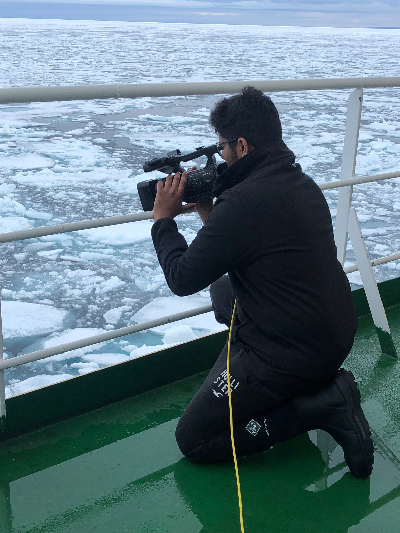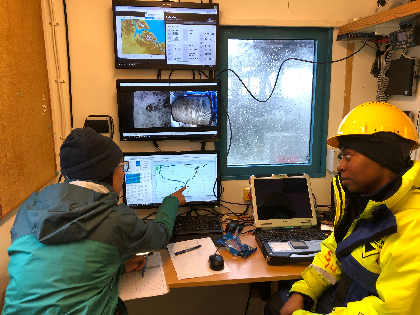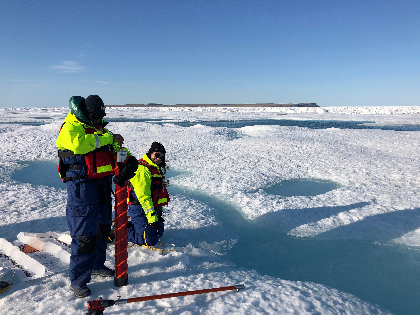Early European explorers of the New World searched in vain for an easy sea route between the Atlantic and Pacific Oceans. The search for a Northwest Passage across the Arctic Ocean claimed many ships and lives, until Roald Amundsen and his crew finally succeeded in making an all-water crossing of this hazardous route in 1906. One consequence of recent rapid Arctic warming is that the Northwest Passage is now ice free (or nearly so) for a longer period of time each year, and establishing shipping routes in this region is no longer a pipe dream.
Rising temperatures and declining sea ice have driven rapid changes across the Arctic and opened a passage to shipping routes, cruise ships, and research vessels. The rate of change in the Arctic is faster than in any other region on Earth, and this change is likely to have profound effects on the function and structure of Arctic ecosystems, including in the Arctic Ocean. Although the Arctic Ocean has become a research focus for many scientists, the relatively inaccessible Canadian Arctic Archipelago, an important portion of the Northwest Passage and a principal connection between the Pacific and North Atlantic Oceans, has received less attention.
Over the past 3 years, researchers and undergraduate students at the University of Illinois at Chicago (UIC) have prepared and joined the Northwest Passage Project, a research and cultural expedition to the Northwest Passage funded by the National Science Foundation and the Heising-Simons Foundation. Participants in the project are seeking to understand how this region is changing as a result of climate change, with the aim of further spreading awareness about the severity and global effects of these changes. The program also seeks to provide a comprehensive research experience in which participants become facilitators of science—no matter what field they go into, this experience will inform their scientific research, science teaching, or sharing science with their communities. Here we present the UIC program and the educational experience from the student participant perspective.
Setting Sail
Last summer, 23 graduate and undergraduate students from minority-serving institutions across the United States, in collaboration with the Swedish Polar Research Secretariat, participated in an unprecedented 3-week expedition as a part of this program. Among this group were five UIC students who boarded the Swedish icebreaker research vessel I/B Oden in Thule, Greenland. The expedition intended to follow the path of a previous failed expedition led by Sir John Franklin in 1845 (Figure 1). For the student participants, the journey before, during, and after our time on the Oden has been long and full of surprises, ordeals, and rewards. This journey has taught us resilience and perseverance, and it has encouraged us to reevaluate our motivations for our career and personal goals.
For the UIC contingent of the expedition, biology professor Miquel A. Gonzalez-Meler and Earth and environmental sciences professor Max Berkelhammer initially recruited 18 undergraduate students majoring in science, technology, engineering, and mathematics (STEM) subjects; social sciences; and humanities. The diversity in academic backgrounds provided us with a holistic perspective into science research experiences, covering not only science but the Arctic economy, anthropology, and science communication. We look forward to carrying these insights into future professional networks, regardless of our professional goals or nonacademic career track.

The UIC students participated in the Northwest Passage Project either by conducting research aboard the cruise through the Northwest Passage or by completing paid research internships at UIC or other institutions designed to support the expedition (e.g., helping with communications efforts or affiliated research projects). In addition, all participants engaged in a program at UIC that included course work in an active learning setting (which emphasizes class interactions and collaborative problem solving), independent research, and the UIC-funded internships.
Although this 21st century program did not suffer the hardships encountered by the 1845 Franklin expedition, in which all 129 crew members abandoned ship and most were never found, getting it launched was not without difficulties. An expedition on a three-mast sailing ship planned for the summer of 2017 had to be canceled because of difficulties in making arrangements with the company that owned the ship.
In the summer of 2018, six UIC students, including three of the authors, traveled to Kugaaruk, Nunavut, Canada, for a second attempt at a research cruise. Unfortunately, after the first day of sailing, their ship, the Akademik Ioffe, ran aground after striking a shoal in uncharted waters. After 26 hours stranded at sea, the students were rescued and returned safely home. After the grounding, it was unclear whether the project would continue, and morale was low. However, we persevered, staying involved in various research projects in UIC labs.
Despite these setbacks, most of the students from the initial 2017 recruitment, with a few new recruits to replace those who had graduated, were still on board with the project when the efforts paid off in 2019. At last, we set sail successfully and could begin working on the research activities we had prepared for over the past 3 years.

Sampling the Air and Sea
The UIC students aboard the successful 2019 expedition had two main objectives. First, we wanted to document greenhouse gas exchange between the ocean and the atmosphere and assess how Arctic climate change is affecting carbon fluxes between these two reservoirs. We did this by collecting data on the isotopic compositions of greenhouse gases in the atmosphere and organic matter in the water column. Second, we wanted to evaluate salinity and water isotopic information to determine how terrestrial processes and the influence of freshwater inputs are affecting marine ecosystem properties.
We conducted these activities in collaboration with the University of Rhode Island (URI), Norwegian Institute for Water Research (NIVA), and Stockholm University. Scientists from URI were aboard the cruise, and we plan to share our data with collaborators at NIVA and Stockholm who provided funding and equipment.

To achieve our objectives, we learned a variety of sampling techniques, including conductivity, temperature, and density (CTD) rosette sampling; continuous underway atmospheric greenhouse gas (carbon dioxide and methane) measurements (taken continuously while the ship was moving); sea ice coring; bucket sampling; and precipitation sampling.
We are assessing elemental and isotopic compositions of our water and air samples to interpret the chemical contributions from cryosphere, land, and freshwater exports into the Arctic Ocean and the interactions between them. Our observations are likely to provide a valuable baseline of carbon source, sink, and inventory data with which to validate carbon flux measurements from monitoring towers on land and from remote sensing data, which have been used to monitor the changing Arctic environment.
The Human Factor
We also participated in outreach activities and visits to archeological sites and Inuit communities. Students visited Beechey Island, where graves of four of the 1845 Franklin expedition crew are located. We also studied the history of Arctic research in this region with the help of historian Hester Blum and environmental journalist Ed Struzik, who were also aboard the cruise.
One of the most impressive activities during the expedition was our visit to Pond Inlet, Nunavut, where we met with Inuit community members and learned about their ancestral knowledge of Arctic habitats. We also met with local students who are members of Ikaarvik, a program that works with Arctic youth to create a bridge between scientific research and their communities.

These interactions with students from different backgrounds fostered interdisciplinary and international connections that have expanded the scientific networks of all the students and enhanced our scientific research through the incorporation of Inuit ancestral knowledge. These interactions also inspired Northwest Passage Project students to pursue science that reaches and incorporates people from underrepresented communities around the world being affected by climate change. Two of us are now premed students studying the ways in which climate change affects human health, especially in remote and developing countries.
Other outreach activities included live broadcasts that the students produced with the help of the Inner Space Center. We shared our experiences, on and off the ship, in real time through daily blog posts, Facebook live broadcasts (see video below), and scheduled broadcasts to museums in the United States. These activities allowed student participants to show their unique perspectives on what scientific research looks like, further the impact of our research, and spread awareness about the changing Arctic.
Home Again and Hard at Work
After returning home following the research expedition last summer, we continued our involvement with the Northwest Passage Project at our institutions. UIC students are currently working with professor Gonzalez-Meler’s Stable Isotope Laboratory and professor Berkelhammer’s Atmosphere, Climate and Ecosystems Laboratory to analyze data and see what we can learn from this hard-to-access yet vital region.
Students also presented research results at national scientific meetings and conferences, including the recent Ocean Sciences Meeting 2020, cosponsored by AGU, the Association for the Sciences of Limnology and Oceanography, and The Oceanography Society, where UIC students gave two poster presentations. For some of us, it was our first scientific conference experience; we were excited to network with other ocean scientists, and we got valuable feedback on our research presentations.
The Northwest Passage Project has provided a critical and inspirational learning experience for us as early-career scientists and citizens by providing an educational background and an extensive field research experience, and it enabled international connections that we would not have made otherwise. These experiences will enrich our lives as we begin careers in medicine and health, science, education, and other fields, and they have left all of us with a greater appreciation for Arctic science and culture. We hope our positive experience in this expedition will inspire others to organize ambitious new research projects that integrate research, education, and public engagement and provide unique outlets to share these experiences with society.
Author Information
Frances Crable (fcrabl2@uic.edu), Cynthia Garcia-Eidell, Theressa Ewa, Humair Raziuddin, and Samira Umar, University of Illinois at Chicago
